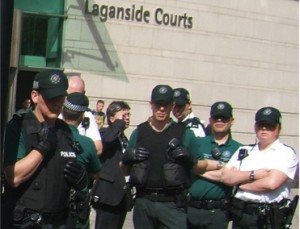
Il tribunale di Strasburgo hanno giudicato un caso coinvolgente due persone fermate vicino ad una fiera d’armi a Londra nel 2003.
La Corte Europea, nel giudizio rilasciato ieri, ha dichiarato che “il Tribunale considera che i poteri di autorizzazione e conferma così come quelli di Stop & Search in base alle sezioni 44 e 45 della Legge 2000 (Terrorismo) non sono sufficientemente circoscritti e neppure soggetti ad adeguata salvaguardia contro gli abusi. Non sono, quindi «in conformità con la legge»”.
Il Tribunale ha anche dichiarato che i poteri costituiscono una violazione dell’Articolo 8 della Convenzione sui Diritti Umani. La Corte ha anche parlato di un chiaro rischio di arbitrarietà nel garantire una larga discrezionalità alla polizia.
Mac Cionnaith ha detto: “Questa sentenza dell’ECHR è estremamente pertinente per le Sei Contee dove c’è stato un drammatico aumento nell’uso dei poteri di Stop & Search (Fermo e Perquisizione) in base alla Sezione 44.
“Il giudizio viene a soli due mesi dalla scoperta dei numeri, secondo i quali tra luglio e settembre dello scorso anno ci sono stati più di 12.000 Stop & Search nelle Sei Contee in base al ‘Terrorism Act’ e al ‘Justice & Security Act’. Oltre 10.000 sono state eseguite in base alla Sezione 44 – la stessa sulla quale la Corte Europea ha emesso il verdetto.
“I numeri del trimestre luglio-settembre sono triplicati rispetto ai tre mesi precedenti. Quelle cifre e la decisione del Tribunale Europeo dimostrano chiaramente l’illegalità e l’arbitrarietà della polizia britannica nelle Sei Contee. E’ una situazione molto lontana da quanto promesso dai partiti nazionialisti che hanno preso la decisione di sostenere la PSNI”.
Prosegue Mac Cionnaith: “Dovrebbe essere anche notato che l’ECHR ha dichiarato che c’è un ulteriore rischio che il potere dello Stop & Search potrebbe essere utilizzato erroneamente contro dimostranti e contestatori, infrangendo gli articoli 10 e/o 11 della Convenzione. Quello è chiaramente il caso relativo alle azioni della PSNI in risposta alla protesta pacifica organizzata da éirígí al posto di telecomunicazioni dell’esercito britannico sulla Black Mountain, fuori Belfast, a novembre dello scorso anno. La PSNI ha usato i poteri di Stop & Search nel tentativo di molestare ed intimidire i partecipanti alla protesta – un fatto che la PSNI aveva cercato di negare al momento.
“Alla luce della sentenza di oggi, chiediamo a tutte le persone oggetto degli Stop & Search da parte della PSNI in basse alla Sezione 44, da oggi in poi, di contattare immediatamente un avvocato chiedendo di sfidare la legalità del fermo e della perquisizione”.
Tratto da éirígí
Stop & Search Illegal Says European Court
The Strasbourg court had been hearing a case involving two protesters stopped near an arms fair in London in 2003. The European Court, in a judgment issued earlier today, stated that “the Court considers that the powers of authorisation and confirmation as well as those of stop and search under sections 44 and 45 of the 2000 (Terrorism) Act are neither sufficiently circumscribed nor subject to adequate legal safeguards against abuse. They are not, therefore, ‘in accordance with the law’.”
The Court also stated that that the powers constituted a violation of Article 8 of the Convention on Human Rights. The Court also stated that there is a clear risk of arbitrariness in the granting of such a broad discretion to police.
Mac Cionnaith said: “This ECHR ruling is extremely pertinent for the Six Counties where there has been a dramatic rise in the use of repressive stop and search powers under Section 44.
“The ruling comes just two months after it was revealed that there were more than 12,000 stop & search incidents in the Six Counties under the British government’s ‘Terrorism Act’ and ‘Justice & Security Act’ between July and September last year. Over 10,000 stop and searches were conducted under Section 44 – the same power which this European Court ruling relates to.
“The figures on stop & search between July and September were three times the number for the previous quarter. Those figures and the European Court ruling clearly demonstrate the illegal and arbitrary reality of British policing in the Six Counties. It is one that is far removed from what was promised by the nationalist parties who took the decision to endorse the PSNI.”
Mac Cionnaith continued: “It should also be noted that the ECHR stated that there is a further risk that such a widely framed stop and search power could be misused against demonstrators and protestors in breach of Article 10 and/or 11 of the Convention. That was clearly the case in relation to the PSNI’s actions in response to a totally peaceful protest organised by éirígí at the British army’s telecommunications post on the Black Mountain, outside Belfast, in November last year. The PSNI used these now discredited stop and search powers in an attempt to harass and intimidate those taking part in the protest – a fact which the PSNI sought to deny at the time.
“In light of today’s ruling, we would urge all persons subjected to stop and search by the PSNI under Section 44 from today onwards to immediately contact a solicitor with a view to challenging the legality of their detention and search.”